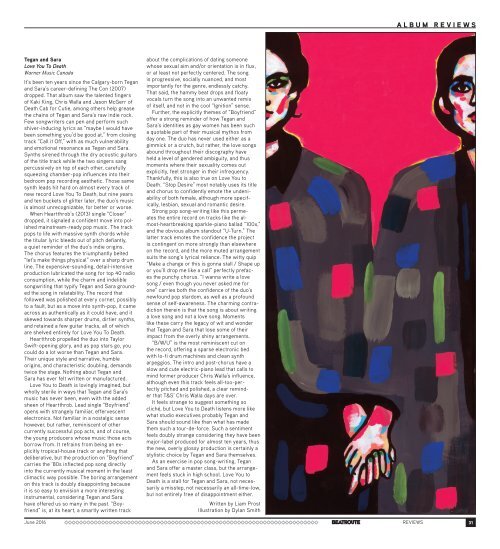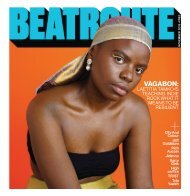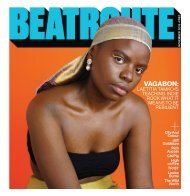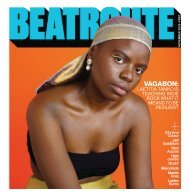BeatRoute Magazine B.C. print e-edition - June 2016
BeatRoute Magazine is a monthly arts and entertainment paper based in Western Canada with a predominant focus on music – local, independent or otherwise.
BeatRoute Magazine is a monthly arts and entertainment paper based in Western Canada with a predominant focus on music – local, independent or otherwise.
You also want an ePaper? Increase the reach of your titles
YUMPU automatically turns print PDFs into web optimized ePapers that Google loves.
ALBUM REVIEWS<br />
Tegan and Sara<br />
Love You To Death<br />
Warner Music Canada<br />
It’s been ten years since the Calgary-born Tegan<br />
and Sara’s career-defining The Con (2007)<br />
dropped. That album saw the talented fingers<br />
of Kaki King, Chris Walla and Jason McGerr of<br />
Death Cab for Cutie, among others help grease<br />
the chains of Tegan and Sara’s raw indie rock.<br />
Few songwriters can pen and perform such<br />
shiver-inducing lyrics as “maybe I would have<br />
been something you’d be good at,” from closing<br />
track “Call it Off,” with as much vulnerability<br />
and emotional resonance as Tegan and Sara.<br />
Synths sirened through the dry acoustic guitars<br />
of the title track while the two singers sang<br />
percussively on top of each other, carefully<br />
squeezing chamber-pop influences into their<br />
bedroom pop recording aesthetic. Those same<br />
synth leads hit hard on almost every track of<br />
new record Love You To Death, but nine years<br />
and ten buckets of glitter later, the duo’s music<br />
is almost unrecognizable, for better or worse.<br />
When Heartthrob’s (2013) single “Closer”<br />
dropped, it signaled a confident move into polished<br />
mainstream-ready pop music. The track<br />
pops to life with massive synth chords while<br />
the titular lyric bleeds out of pitch defiantly,<br />
a quiet reminder of the duo’s indie origins.<br />
The chorus features the triumphantly belted<br />
“let’s make things physical” over a sharp drum<br />
line. The expensive-sounding, detail-intensive<br />
production lubricated the song for top 40 radio<br />
consumption, while the charm and indelible<br />
songwriting that typify Tegan and Sara grounded<br />
the song in relatability. The record that<br />
followed was polished at every corner, possibly<br />
to a fault, but as a move into synth-pop, it came<br />
across as authentically as it could have, and it<br />
skewed towards sharper drums, dirtier synths,<br />
and retained a few guitar tracks, all of which<br />
are shelved entirely for Love You To Death.<br />
Heartthrob propelled the duo into Taylor<br />
Swift-opening glory, and as pop stars go, you<br />
could do a lot worse than Tegan and Sara.<br />
Their unique style and narrative, humble<br />
origins, and characteristic doubling, demands<br />
twice the stage. Nothing about Tegan and<br />
Sara has ever felt written or manufactured.<br />
Love You to Death is lovingly imagined, but<br />
wholly sterile in ways that Tegan and Sara’s<br />
music has never been, even with the added<br />
sheen of Heartthrob. Lead single “Boyfriend”<br />
opens with strangely familiar, effervescent<br />
electronics. Not familiar in a nostalgic sense<br />
however, but rather, reminiscent of other<br />
currently successful pop acts, and of course,<br />
the young producers whose music those acts<br />
borrow from. It refrains from being an explicitly<br />
tropical-house track or anything that<br />
deliberative, but the production on “Boyfriend”<br />
carries the ‘80s inflected pop song directly<br />
into the currently musical moment in the least<br />
climactic way possible. The boring arrangement<br />
on this track is doubly disappointing because<br />
it is so easy to envision a more interesting<br />
instrumental, considering Tegan and Sara<br />
have offered us so many in the past. “Boyfriend”<br />
is, at its heart, a smartly written track<br />
about the complications of dating someone<br />
whose sexual aim and/or orientation is in flux,<br />
or at least not perfectly centered. The song<br />
is progressive, socially nuanced, and most<br />
importantly for the genre, endlessly catchy.<br />
That said, the hammy beat drops and floaty<br />
vocals turn the song into an unwanted remix<br />
of itself, and not in the cool “Ignition” sense.<br />
Further, the explicitly themes of “Boyfriend”<br />
offer a strong reminder of how Tegan and<br />
Sara’s identities as gay women has been such<br />
a quotable part of their musical mythos from<br />
day one. The duo has never used either as a<br />
gimmick or a crutch, but rather, the love songs<br />
abound throughout their discography have<br />
held a level of gendered ambiguity, and thus<br />
moments where their sexuality comes out<br />
explicitly, feel stronger in their infrequency.<br />
Thankfully, this is also true on Love You to<br />
Death. “Stop Desire” most notably uses its title<br />
and chorus to confidently emote the undeniability<br />
of both female, although more specifically,<br />
lesbian, sexual and romantic desire.<br />
Strong pop song-writing like this permeates<br />
the entire record on tracks like the almost-heartbreaking<br />
sparkle-piano ballad “100x,”<br />
and the obvious album standout “U-Turn.” The<br />
latter track emotes the confidence the project<br />
is contingent on more strongly than elsewhere<br />
on the record, and the more muted arrangement<br />
suits the song’s lyrical reliance. The witty quip<br />
“Make a change or this is gonna stall / Shape up<br />
or you’ll drop me like a call” perfectly prefaces<br />
the punchy chorus. “I wanna write a love<br />
song / even though you never asked me for<br />
one” carries both the confidence of the duo’s<br />
newfound pop stardom, as well as a profound<br />
sense of self-awareness. The charming contradiction<br />
therein is that the song is about writing<br />
a love song and not a love song. Moments<br />
like these carry the legacy of wit and wonder<br />
that Tegan and Sara that lose some of their<br />
impact from the overly shiny arrangements.<br />
“B/W/U” is the most reminiscent cut on<br />
the record, offering a sparse electronic bed<br />
with lo-fi drum machines and clean synth<br />
arpeggios. The intro and post-chorus have a<br />
slow and cute electric-piano lead that calls to<br />
mind former producer Chris Walla’s influence,<br />
although even this track feels all-too-perfectly<br />
pitched and polished, a clear reminder<br />
that T&S’ Chris Walla days are over.<br />
It feels strange to suggest something so<br />
cliché, but Love You to Death listens more like<br />
what studio executives probably Tegan and<br />
Sara should sound like than what has made<br />
them such a tour-de-force. Such a sentiment<br />
feels doubly strange considering they have been<br />
major-label produced for almost ten years, thus<br />
the new, overly glossy production is certainly a<br />
stylistic choice by Tegan and Sara themselves.<br />
As an exercise in pop song-writing, Tegan<br />
and Sara offer a master class, but the arrangement<br />
feels stuck in high school. Love You to<br />
Death is a stall for Tegan and Sara, not necessarily<br />
a misstep, not necessarily an all-time-low,<br />
but not entirely free of disappointment either.<br />
Written by Liam Prost<br />
Illustration by Dylan Smith<br />
<strong>June</strong> <strong>2016</strong> REVIEWS<br />
31


















